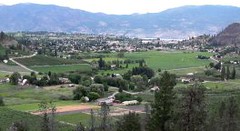There seems to be a fair bit of background buzz over the mayor's
latest column in the
Review. I wasn't as interested in his usual theorizing about water issues, but I did some digging into the so-called study he referenced here:
"On the OCP front, a new study came out that underlined that municipalities are failing miserably in their duty to bring more serviced land on the market and as a result the price of land, particularly lots, is going sky high, right across Canada."
Before we go too much further, it is revealing to find out that the organization doing the "study" appears to be a front for a coalition of industry organizations and corporations who depend on the continual expansion of single-family suburban development.
Clayton Research describes their clients better than I could:
"Reflecting our diverse expertise and the reliability of our analysis, our clients include a wide mix of real estate developers and builders, investors, financial institutions, manufacturers, retailers, industry associations, and all levels of government."
So, we've got a "study" from a group of "researchers" who provide
expert witnesses supporting residential development on prime agricultural land. Their slick opposition to any legislation limiting spawl, slowing growth or the establishment of greenbelts in Ontario landed them all kinds of
press showing exactly where they stand on these issues. It's not surprising that the mayor has bought into their sprawling dream, and his prescription to remedy the supposed problem of a limited supply of land was already obvious in the last draft of the OCP, but he repeats it clearly for our benefit:
"Your present and future councils need to continue to focus on the creation of more serviced land, primarily by increasing density and promoting the creation of lots within the serviced areas."
His main assertion here is ridiculous. It is
not the primary role of council to promote sprawling residential development. The only part worth agreeing with is the goal of increasing density in existing residential areas, and I hope this represents the future of population growth in Summerland. But we already know (after studying the second draft of the OCP) that the obvious agenda is to transform agricultural land and surrounding hillsides into cul-de-sacs, lawns and giant garages with houses hidden behind them.
The mayor is attempting to sell this idea by pretending that developing new land in Summerland will provide affordable housing for poor seniors and working-class young families:
"One of council's duties in reviewing the OCP is to consider the needs for housing of everyone - including the elderly who want apartments and assisted living units, and the young families, who want affordable housing."
Yeah, right. As if any of residential suburb planned for Summerland Vistas on Cartwright's eastern slope will qualify as "affordable" -- expect more Deer Ridge-style lots going for $130,000+ with $200,000+ houses on top of them. If they manage to remove ALR land north of town, we might see some new condos and townhouses thrown in with the pink-stucco single-family villas, but they'll all be starting somewhere between $180,000 and $200,000 with little likelihood of affordable rental properties in the mix.
The reality in any of the new areas slated for development in the second draft is that a select few are going to make a
lot of money selling property and housing to new residents, and these new citizens will all be living too far away from downtown to walk (so they'll shop at Canadian Tire, Save-On and Wal-Mart on their way home from work), complaining about gas prices, congestion and a lack of parking because they're stuck in their vehicles to take their kids to soccer practice...and we'll all be paying for the sewer lines to accept the sludge from their four-bathroom homes, the water for their manicured lawns and swirling hot tubs, never mind expanded and new roads to funnel their SUV's through our school zones and stop signs.
Ok, so maybe I'm veering a bit into parody and reactionary stereotypes. I'm just thinking that there must be a better way. Is suburban sprawl the extent of our vision for the future? I think not -- more on this later.
 I'm considering attending the hearing for the opposite reason -- I'd like to see them increase the density further. That area (Spencer Avenue, Ritchie Street and Orchard Crescent) is close enough to downtown for people to walk for just about everything. Why not create high-quality, high-density housing there that encourages more people to walk, talk to their neighbours, and offers a mix of housing options?
I'm considering attending the hearing for the opposite reason -- I'd like to see them increase the density further. That area (Spencer Avenue, Ritchie Street and Orchard Crescent) is close enough to downtown for people to walk for just about everything. Why not create high-quality, high-density housing there that encourages more people to walk, talk to their neighbours, and offers a mix of housing options?
